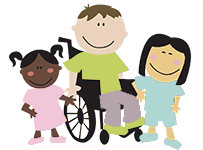Early Childhood Intervention is critical for treating speech and language disorders as well as self-help and motor disorders in young children.
Speech and language disorders are the most prevalent developmental delays during the first three years of life. Without intervention a child may likely continue to experience long term difficulties related to language (Lombardino & Vaudreuill, 1998).
According to ASHA (American Speech-Language and Hearing Association) 2007, Language refers to the cognitive system that allows individuals to understand and formulate language systems. So language success impacts a child’s ability to understand and be a part of his or her world. Speech refers to the ability to produce speech sounds. A child may understand the language system but have challenges incorrectly producing the sounds necessary to interact successfully with his peers.
Young children may also experience delays or disorders in regard to self-care routines and habits, such as self-feeding and dressing. They may also lack appropriate play skills and motor development. These skills are very important for daily functioning, independence and a positive sense of wellbeing. More information about activities of daily living and the role of occupational therapy in early intervention can be found at AOTA (American Occupational Therapy Association).
Speech-Language Pathologist and Occupational Therapists who specialize with children are highly trained professionals that address these critical life skills.
Effective intervention, at any age, is a deliberate process with a purpose and assessment-driven goals. The professional first evaluates the child, reviewing history and development as well as interviewing parents or caregivers. Developmental scales and standardized/or non-standardized assessments are also used, based on the individual needs of the child. Observation and interaction are also a crucial part of the evaluation process. After a thorough assessment, a detailed report is written and a treatment plan is created, based on the findings from the evaluation. The report should provide the family and other professionals involved in a child’s life valuable information about the child’s strengths, weaknesses and needs. Treatment plans should have measurable goals to aid in tracking therapy progress.
At this point, a child is ready to start treatment. To an observer, early childhood intervention may look like play, but there is a design in place, to encourage naturally occurring opportunities to work on individual goals. You may have heard the saying, “Play is a child’s work”. And for good pediatric therapy, this is true. Therapy must be engaging and meaningful to elicit the imitation, initiation, responsiveness and practice necessary to form new skills. Natural environments, with interesting, developmentally appropriate activities are also an important part of the therapy process.
Another critical piece of early childhood intervention is family training and support. Observing the therapist in action, for at least part of treatment is important so families can incorporate practice and new skills into daily life. Therapist may also provide specific strategies and materials to help foster the generalization of new skills. Adaptive equipment may be recommended in some cases to facilitate the development of age-appropriate skills. Families have a professional with whom they can share concerns, questions and experiences: A childhood specialist they know cares and understands their child’s needs and unique personality.
Young children need early intervention if they have developmental challenges so they can meet their greatest potential. It is important to talk to your pediatrician if you suspect that your child has developmental challenges that could impact communication, self-care, or motor abilities. An evaluation by a qualified speech-language pathologist or occupational therapist will give you peace of mind about your child’s development or provide direction and support if your child may need intervention. Many commercial insurance plans, as well as Medicaid, cover evaluations and treatment. You can check with your insurance to locate in-network providers of pediatric speech and occupational therapy.
